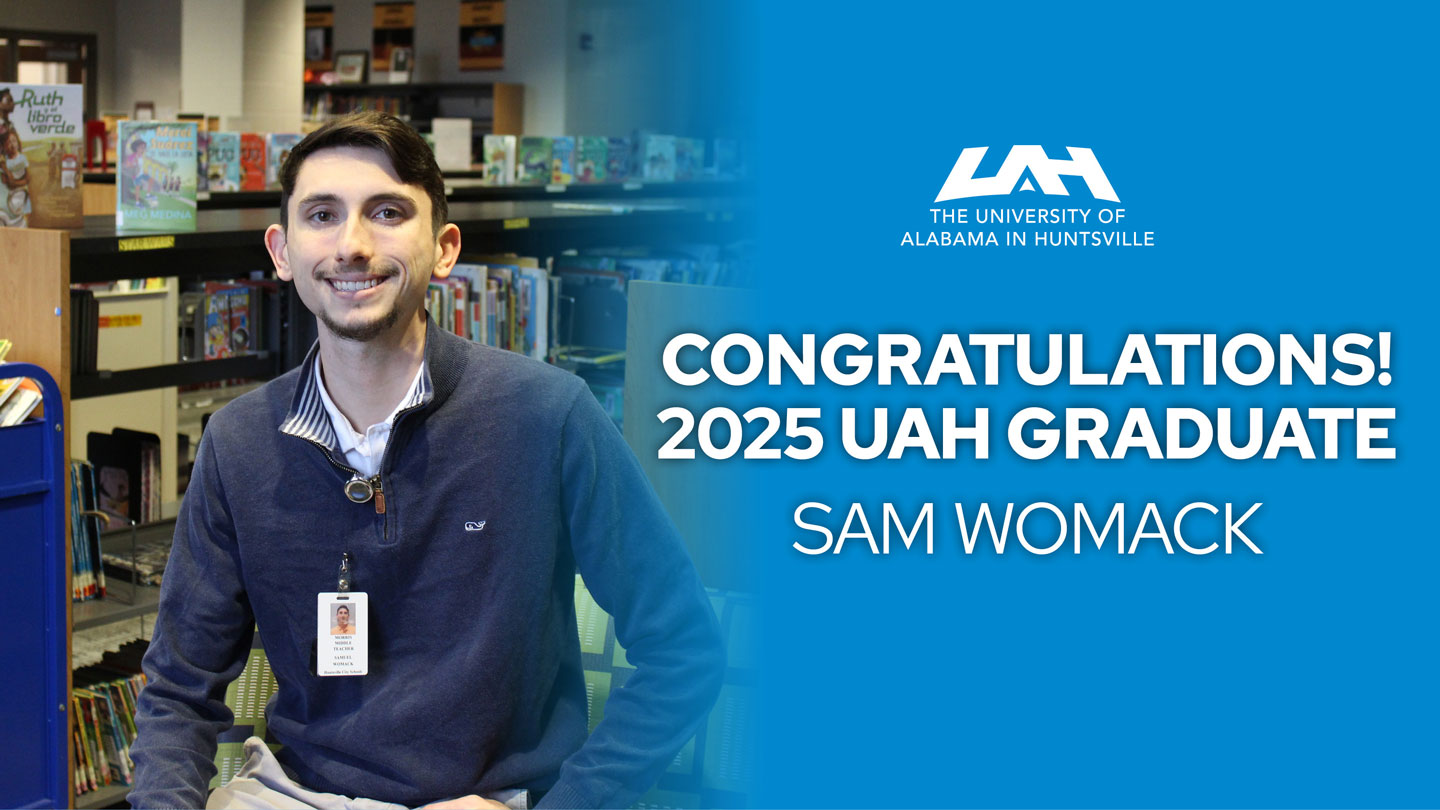
Morris Middle School history teacher Sam Womack has learned strategies to help his students achieve English language proficiency while pursuing his master’s degree through the Project DIAL program in the College of Education at The University of Alabama in Huntsville (UAH). Spring commencement ceremonies are set for May 5, 2025, at the Von Braun Center.
Ann Marie Martin | UAH
Sam Womack was ready to teach world history to eighth graders when he began his career three years ago at Morris Middle School, but he faced a language barrier. He needed effective strategies to communicate his lessons to the English learners (ELs) in his classes.
“How can you teach a kid and expect them to learn when everything you’re doing is in English, and they may have had only a few months of exposure to the English language? I saw that, but I didn’t really know what I could do.”
The issue of language fluency extended beyond English learners. Womack’s classes included native speakers of English who were struggling to read and write at grade level.
Thanks to Project DIAL, now Womack can employ techniques to help all his students address English language challenges.
Project DIAL (Designing Instruction for Academic Literacies) encompasses a number of initiatives to support teachers across the region, including scholarships for graduate degrees in the College of Education at The University of Alabama in Huntsville (UAH), a part of The University of Alabama System. Womack is set to graduate in the program’s first cohort on May 5.
“This project was specifically designed to help secondary content teachers like Sam,” said Dr. Andrea Word, Project DIAL director and clinical assistant professor in the College of Education. “The goal is to have content teachers prepared to work with English learners in the content classrooms because we know that when they are prepared to work with ELs, it enhances their skills in service to ALL – an acronym that stands for Academic Language Learners.
“There is a growing awareness across the education sector that preparing teachers to meet the needs of all students includes preparing them to look at language rather than through it,” Word continued. “Since our inception 10 years ago, our college has focused on differentiated instruction (DI), which is foundational in meeting the needs of all students. In our own spin on DI, we also prepare teachers to address the intricacies of language and literacy across content from math to science, social studies and, of course, English language arts.”
The Huntsville City, Madison City and Madison County school systems partnered with UAH on Project DIAL, which began offering scholarships in summer 2023 for the first cohort of more than 20 teachers. In 2024, the Albertville and Fort Payne school systems signed on, too, and a second cohort of 27 teachers began their studies in May 2024.
“It’s been eye-opening,” Womack said. “You hate to see kids struggle, and you want to help them, but you also have to find the best way to go about it. That’s where these best practices that we learned through Project DIAL and through our coursework come into play.”
The benefits of Project DIAL have surpassed Womack’s expectations.
“The content and the skills that we’ve learned are the building blocks for understanding the English language – and that goes for everybody,” he said. “Anyone who is learning English has to start from somewhere. If you’re teaching someone who knows a different language how to speak English, or you’re teaching an English speaker how to use English more effectively, you are still breaking down the English language for people who need help understanding it or improving their skills.
“What I’ve learned through Project DIAL really has helped across the spectrum, whether they’re a non-native English speaker or a native English speaker.”
A couple of Womack’s students volunteered to help him test the techniques. Two beginning English speakers spent 30 minutes twice a week for three weeks. They started the informal study with a vocabulary quiz.
“We did these different strategies, like looking at pictures that related to the vocabulary words. We did some fill-in-the-blank practice on how to use the words correctly. Then we did some flash card practice with how to pronounce the words. After three weeks, we retook a vocabulary quiz similar to the first one, and both of the students’ scores went up.”
Although it was a very small study sample, Womack was encouraged by results that moved in the right direction.
Womack has also seen improvements in his students’ writing ability on history assignments.
“They can break down these complex events that happened across different historical timelines into really simple English and explain in their own words what happened. We can see where they are on their English skills and where they are in the history content just based on their writing.”
Womack appreciates the ways Project DIAL has helped him improve his own teaching skills.
“I feel better prepared to help my students now. I feel prepared to broaden myself as a teacher, to address more areas where students struggle that I may not have been prepared to address fresh out of my undergraduate studies. I have a lot more strategies and more research studies and more understanding under my belt to better help all of my students than I think I did when I first started three years ago.”